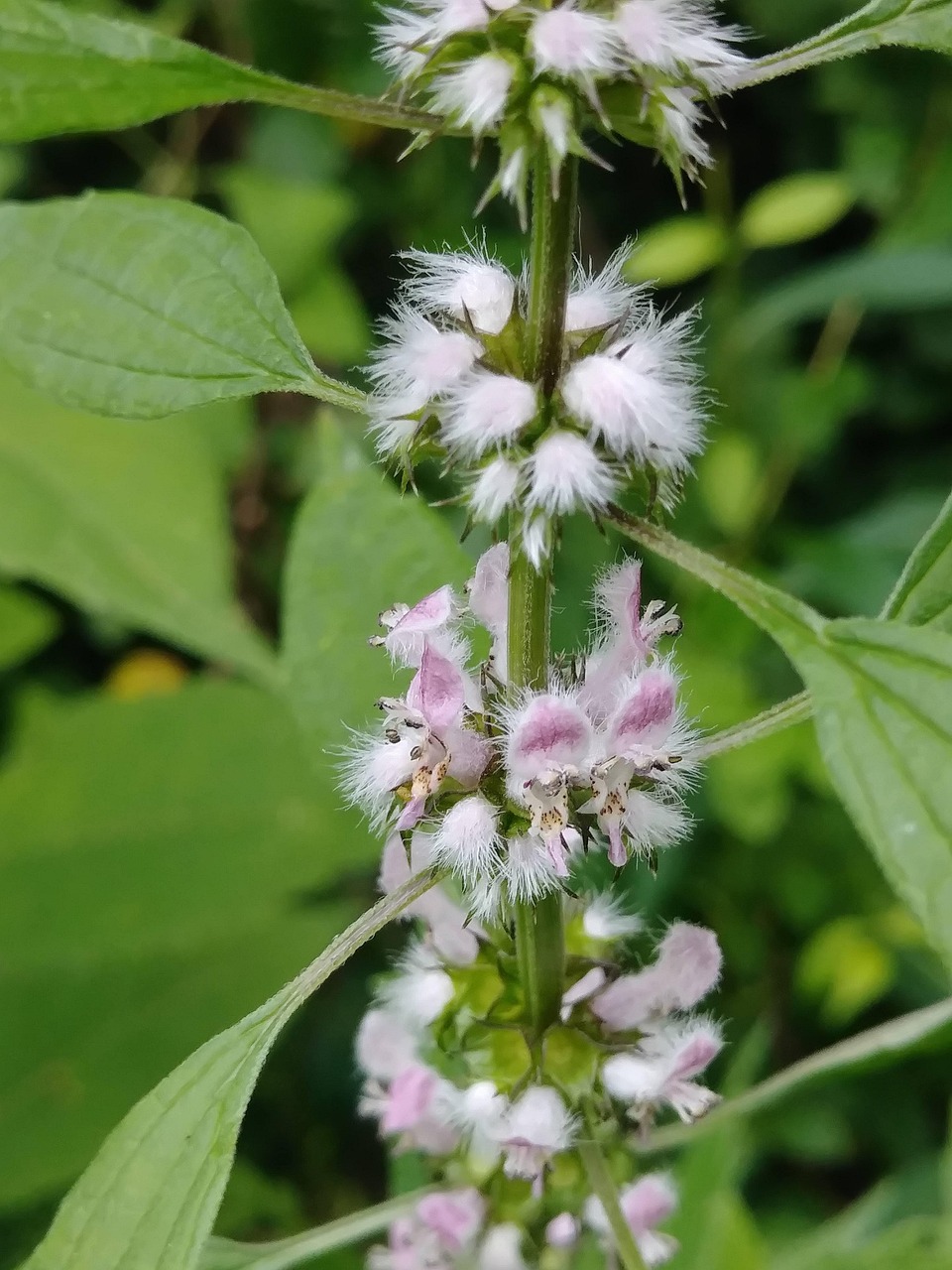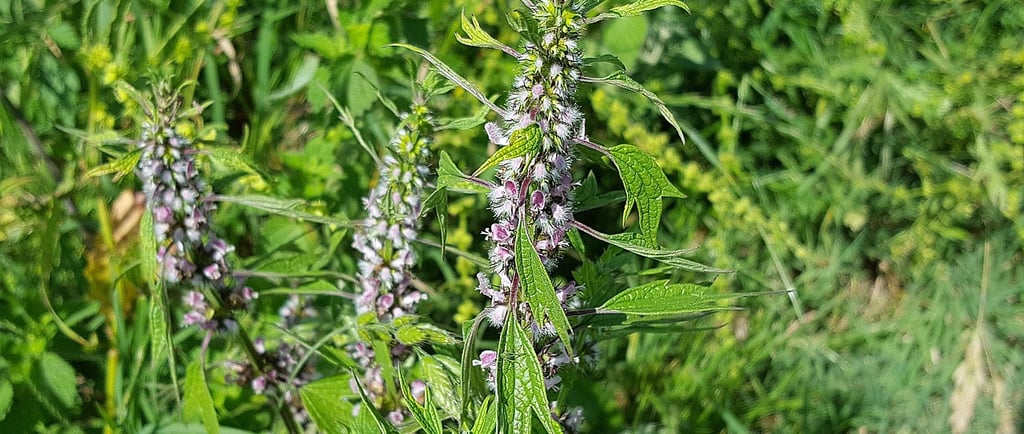Motherwort – For the Heart and Nerves
A herb of strength and softness - Motherwort steadies the heart, soothes the nerves, and brings the body back to balance. Rooted in folk wisdom and carried through generations, it reminds us that healing often begins with stillness.
PLANT WISDOM JOURNAL
Sigita Gyva


Motherwort (Leonurus cardiaca) is a perennial herb long known in folk medicine as a harmonizer of the heart and nervous system. Native to Central Asia and southern parts of Europe, it has also become well-established in Lithuania. The herb is valued not only for its healing properties but also for its ornamental beauty—its soft violet flowers and serrated leaves grace fields, meadows, and garden edges.
One of Motherwort's most distinctive features is its effect on heart rhythm and blood pressure. Modern studies confirm the wisdom of traditional use: Motherwort has calming and vasodilatory properties that help reduce stress and tension. Thanks to these effects, it is increasingly included in herbal preparations intended to manage stress, insomnia, or irregular heartbeat.
In Lithuania, Motherwort is also called "vilkžolė" or "liūtažolė," each name reflecting its character. This is a plant that combines gentleness with strength—it calms yet also tones. No wonder it was once considered a key herb for supporting women's emotional and physical balance.
Healing Properties of Motherwort
Motherwort is best known for its heart-strengthening and calming effects. It helps with high blood pressure, palpitations, and stress. It’s a natural ally for those experiencing anxiety, tension, or insomnia. Motherwort reduces heart rate and helps restore internal balance without the intervention of strong medications.
Another notable benefit is its impact on the nervous system. With a gentle yet effective calming action, Motherwort tea or tincture can help ease anxiety and tension and improve sleep. It is often recommended for people living under high stress or dealing with emotional strain.
Motherwort is also an invaluable companion for women. It helps regulate the menstrual cycle, eases cramps, and alleviates menopause symptoms. Acting as a gentle hormonal balancer, it helps the body adjust to life’s natural cycles without the need for synthetic hormones.
Dried Motherwort – A Natural Way to Support Wellness
Dried Motherwort offers a convenient and long-lasting way to benefit from the plant’s healing properties year-round. It retains its active compounds—flavonoids, alkaloids, bitters, tannins, and essential oils—making it perfect for home preparation of teas, infusions, or tinctures. It’s an ideal choice for those who value natural and safe ways to strengthen their bodies.
To make a heart- and nerve-soothing infusion, steep one teaspoon of dried Motherwort in a cup of hot water. This calming drink improves sleep and helps the body unwind after a long day. Dried Motherwort can also be used in herbal blends with Melissa, Hawthorn, Valerian, or Chamomile.
Beyond teas, dried Motherwort can also be used in baths or compresses. Warm infusions help relax tired muscles and support skin care, especially in times of stress or nervous-related skin irritation. It’s a truly versatile herb worth keeping in every home’s natural medicine cabinet.
When and How to Harvest Motherwort
The best time to harvest Motherwort is during its flowering phase. The upper parts of the plant—flowering stems and leaves—are used for medicinal purposes. Always harvest from clean, uncontaminated areas, far from roads and industrial zones, to ensure the purity of the plant material.
After gathering, it’s essential to dry the herb properly. Dried Motherwort should retain a light green color and a mild scent. Dry it in the shade in a well-ventilated area, spreading it thinly on paper or cloth. Improper drying may reduce its medicinal value, so quality matters.
Properly stored, dried Motherwort can last up to two years. Keep it in tightly sealed glass jars, away from direct sunlight and moisture. This will preserve its healing qualities and ensure this natural ally is always within reach when needed.


Traditional and Spiritual Use of Motherwort
Motherwort has long been regarded as a woman’s herb—gentle yet strong, helping to restore inner equilibrium. Traditionally, it was believed to protect not only the physical heart but also the spiritual center. Its smoke was used in smudging rituals to release negative emotions or prepare the body and soul for rest. This is a plant that nurtures both body and spirit.
In Lithuanian folk wisdom, Motherwort was known as the "herb for heartache." It was sewn into pillows to ease dreams or drunk before sleep to lighten the heart. Women used it not only for health but also in ritual—to reclaim calm, confidence, and inner strength.
On a spiritual level, Motherwort teaches us to slow down, listen to the voice of our heart, and return to ourselves. It’s a plant for the modern human—tired of noise, speed, and external pressure. It invites us into deep breath, stillness, and self-sensing—a reminder that true strength is found in calm.
Motherwort's Energetics
Motherwort has a rather straightforward taste: bitter. And just like its taste, its energetic profile is direct. The bitterness points to a strong cooling action, and this cooling is intensified by its intense bitterness. Bitter plants tend to be drying, as the increased secretions they provoke eventually lead to elimination and a reduction of internal moisture.
Its tonic action is relaxing—evident in its antispasmodic and calming effects on the nerves. Motherwort is a clear, focused plant: it relaxes, cools, and grounds.
Disclaimer & Holistic Responsibility Statement
At Manua, we honor the deep roots of ancestral plant wisdom. Every offering shared on this platform reflects traditional herbal knowledge and our own lived experience with nature's remedies. However, it is essential to approach wellness with discernment and personal responsibility.
Our products and content are not intended to diagnose, treat, cure, or prevent any disease.
All descriptions, including uses and benefits, are provided for educational and informational purposes only, and are based on traditional uses, folk practices, and naturalist perspectives.
This offering is not a substitute for professional medical advice, diagnosis, or treatment. We do not make medical claims and we do not encourage replacing prescribed care with herbal preparations.
We strongly encourage each individual to make health decisions with intention—guided by multiple sources of information, personal experience, and the support of a trusted healthcare provider. Always consult with your physician, naturopath, or clinical herbalist if you are pregnant, breastfeeding, taking medications, or navigating a specific health condition.
Nature’s path is personal. Trust your intuition. Listen to your body. Seek wisdom where it aligns with your truth.
Gather with us in the wild web
Living closer to nature, through learning and presence.
Letters from the Wild
© 2025. All rights reserved.
